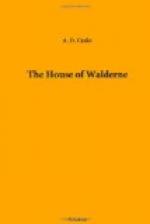And Martin was still fulfilling his vocation as a novice of the Order of Saint Francis, and was close upon the attainment of the dignity of a scholastic degree—preparatory (for so his late lamented friend had advised) to a closer association with the brotherhood, who no longer despised, as their father Francis did, the learning of the schools.
We say late lamented friend, for Adam de Maresco had passed away, full of certain hope and full assurance of “the rest which remaineth for the people of God.” He died during Martin’s second year at Oxford.
Meanwhile the political strife between the king and the barons had reached its height. The latter felt themselves quite superseded by the new nobility, introduced from Southern France. The English clergy groaned beneath foreign prelates introduced, not to feed, but to shear the flocks. The common people were ruined by excessive and arbitrary taxation.
At last the barons determined upon constitutional resistance, and Earl Simon, following the dictates of his conscience, felt it his duty to cast in his lot with them, although he was the king’s brother-in-law. Still, his wife had suffered deeply at her brother’s hands, and was no “dove bearing an olive branch.”
It was in Easter, 1258, and the parliament, consisting of all the tenants in capiti, who hold lands directly from the crown, were present at Westminster. The king opened his griefs to them—griefs which only money could assuage. But he was sternly informed that money would only be granted when pledges (and they more binding than his oft-broken word) were given for better government, and the redress of specified abuses; and finally, after violent recriminations between the two parties, as we should now say the ministry and the opposition, headed by Earl Simon, parliament was adjourned till the 11th of June, and it was decided that it should meet again at Oxford, where that assembly met which gained the name of the “Mad Parliament.”
On the 22nd of June this parliament decreed that all the king’s castles which were held by foreigners should be rendered back to the Crown, and to set the example, Earl Simon, although he had well earned the name “Englishman,” delivered the title deeds of his castles of Kenilworth and Odiham into the hands of the king.
But the king’s relations by marriage refused to follow this self-denying ordinance, and they well knew that neither the old king nor his young heir, Prince Edward, wished them to follow Earl Simon’s example. A great storm of words followed.
“I will never give up my castles, which my brother the king, out of his great love, has given me,” said William de Valence.
“Know this then for certain, that thou shalt either give up thy castles or thy head,” replied Earl Simon.
The Poitevins saw they were in evil case, and that they were outnumbered at Oxford. So they left the court, and fled all to the Castle of Wolvesham, near Winchester, where their brother, the Bishop Aymer, made common cause with them.




